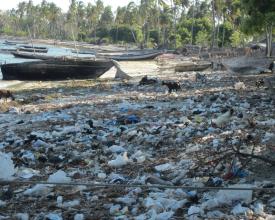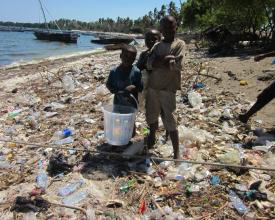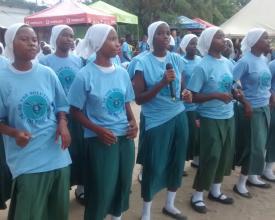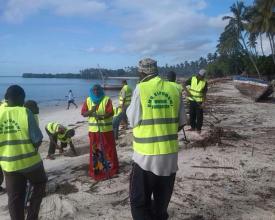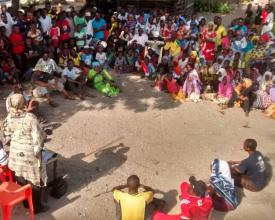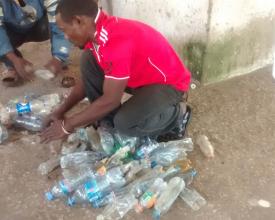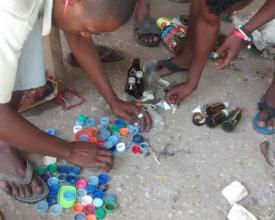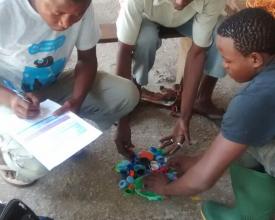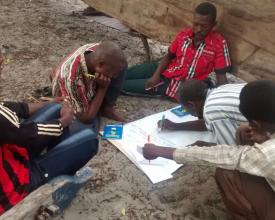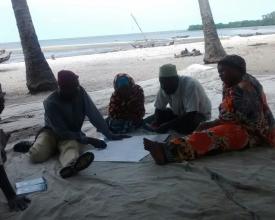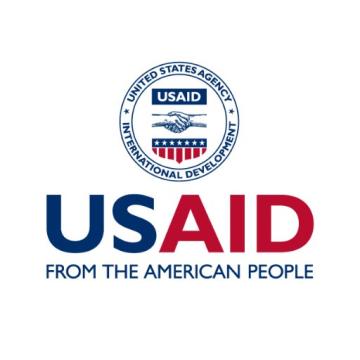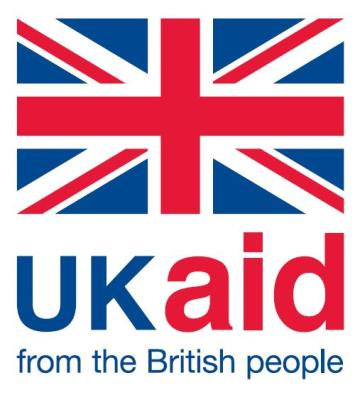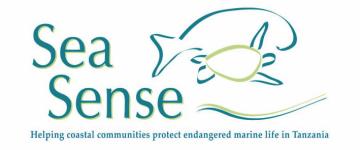
Influencer l'attitude des communautés à l'égard de la gestion des déchets
Solution complète
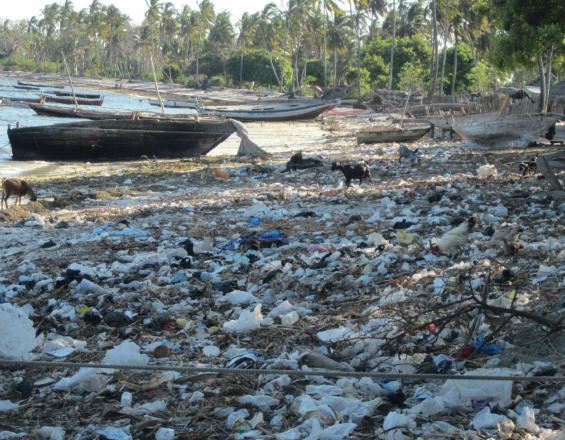
La plage de Kipumbwi recouverte de détritus
Sea Sense
Cette solution permet de remédier à la mauvaise gestion des déchets dans le district de Pangani, en Tanzanie, au sein d'une communauté côtière sur un site pilote. Des outils de sensibilisation créatifs et participatifs ont été utilisés pour faire prendre conscience de l'importance de la gestion des déchets, pour engager le dialogue entre les citoyens et les chefs de village, et pour mobiliser les gens dans l'action. Les citoyens et les dirigeants ont ensuite appliqué leurs nouvelles connaissances pour formuler des règlements locaux sur la gestion des déchets, fournissant ainsi un cadre juridique durable pour une meilleure gestion des déchets.
Dernière modification 30 Sep 2020
5332 Vues
Contexte
Défis à relever
Mauvaise gestion des déchets, dégradation des habitats côtiers, bien-être humain La solution s'attaque au problème de la mauvaise gestion des déchets dans les communautés côtières où les plages et autres habitats côtiers, tels que les forêts et les mangroves, sont fréquemment utilisés comme dépotoirs pour les déchets ménagers et comme latrines publiques. La solution aborde les attitudes à l'égard de la gestion des déchets et modifie les comportements qui contribuent à la dégradation de l'habitat et exposent les citoyens à des maladies infectieuses.
Emplacement
District de Pangani, Tanzanie, Afrique de l'Est
Afrique de l'Est et du Sud
Traiter
Résumé du processus
Les éléments constitutifs sont organisés de manière à créer un environnement favorable au changement en fournissant d'abord un accès à l'information d'une manière très participative afin que les citoyens ne se sentent pas obligés d'aller à l'encontre des normes sociales ou culturelles. Au fil des étapes, les citoyens se sentent habilités à adopter des comportements plus positifs et commencent à comprendre l'importance de la responsabilité personnelle. Grâce à l'engagement des dirigeants locaux dès le départ, la solution aide à établir des relations entre les dirigeants et les citoyens de manière à ce qu'il y ait une vision commune pour la communauté en ce qui concerne la gestion des déchets. Cette vision commune est appliquée par le biais de la formulation de règlements sur la gestion des déchets. Étapes : 1. Identifier le problème par des visites sur le terrain, des discussions/réunions avec les parties prenantes, etc. 2. Planifier et mettre en œuvre une stratégie de sensibilisation. 3. Obtenir le soutien des principales parties prenantes, par exemple les chefs de village, les conseillers, les députés, les autorités du district. 4. Renforcer la capacité des acteurs communautaires à prendre l'initiative sur la question. 5. Faciliter la formulation de règlements locaux ou d'autres cadres juridiques. 6. Documenter et diffuser les résultats du projet le plus largement possible afin de stimuler l'intérêt pour la reproduction et de plaider en faveur de changements politiques appropriés.
Blocs de construction
Sensibilisation de la communauté aux conséquences d'une mauvaise gestion des déchets
Un programme d'éducation et de sensibilisation (par exemple, théâtre communautaire, campagne radiophonique, événements communautaires) est mis en œuvre pour sensibiliser à la gestion des déchets, stimuler le dialogue initial et influencer les changements d'attitude et de comportement. Le théâtre communautaire est un outil très efficace pour atteindre cet objectif. Jusqu'à 5 membres de la communauté sont formés à la collecte de données et passent une semaine à interroger les citoyens et les principales parties prenantes afin de recueillir des "données" sur les attitudes, les comportements et les perceptions à l'égard de la gestion des déchets. Un deuxième groupe de citoyens (jusqu'à 15) est formé en tant qu'"artistes" et participe à une semaine de formation (narration d'histoires, jeux de rôle et écriture de scénarios) et de répétitions. À la fin de la semaine, la représentation théâtrale a lieu. À certains moments critiques de la représentation, un maître de cérémonie invite le public à poser des questions, à échanger des idées et des expériences, et à débattre des solutions à apporter aux problèmes de gestion des déchets. Le théâtre communautaire est suivi d'activités pratiques de sensibilisation telles que des nettoyages de plages pour introduire le concept des quatre R (refuser, réduire, réutiliser, recycler). Les chefs de village sont encouragés à participer à des activités pratiques pour promouvoir la bonne gouvernance et un leadership fort.
Facteurs favorables
Participation de la communauté, soutien du gouvernement au niveau du village, ressources financières
Leçon apprise
Les scénarios créés dans le cadre des projets de théâtre communautaire abordent souvent la question de la faiblesse de la gouvernance. Il est important que le maître de cérémonie de la représentation finale sache gérer le débat, faute de quoi les dirigeants pourraient avoir l'impression que leur position est sapée. Les débats peuvent également être très conflictuels, avec de nombreux points de vue opposés. Un maître de cérémonie compétent doit donc être en mesure d'offrir une plateforme aux citoyens pour qu'ils s'expriment, tout en facilitant un dialogue constructif. Le maître de cérémonie doit maintenir une position neutre et équilibrée afin que les opinions des citoyens soient défendues plutôt que celles du maître de cérémonie lui-même.
Ressources
Renforcer les capacités de recyclage des déchets
Un groupe communautaire (par exemple, un comité environnemental, une association de pêcheurs) est formé aux techniques de collecte de données sur les différents types de déchets (organiques et non organiques) que l'on trouve couramment sur les plages, afin d'identifier les articles à recycler ou à réutiliser. Après la formation, le groupe est en mesure de trier et de classer les différents types de déchets et de remplir une fiche de données sur les débris marins. Cette fiche peut être soumise à l'Ocean Conservancy aux États-Unis, qui gère une base de données mondiale sur les déchets marins. Cette activité contribue à renforcer le sentiment d'appropriation de l'environnement local et le sentiment d'appartenance à une initiative plus large. Au niveau local, les articles recyclables, tels que les bouteilles en plastique, les tongs et le verre, peuvent être séparés et vendus à des collecteurs. La communauté est ainsi en mesure de générer des revenus à partir des déchets. Le groupe est reconnu par ses pairs comme une équipe communautaire de gestion des déchets, ce qui lui permet de faire pression sur ses concitoyens et sur les politiciens locaux (conseillers et députés) pour qu'ils prennent des mesures supplémentaires en matière de gestion des déchets.
Facteurs favorables
Engagement des groupes communautaires à relever les défis de la gestion des déchets
Leçon apprise
Au fur et à mesure que les activités de recyclage démarrent et que des possibilités de générer des revenus se présentent, il est important d'établir comment les revenus sont gérés et distribués de manière à ce qu'ils soient justes, équitables et transparents. Idéalement, tout revenu généré par la vente de déchets recyclables devrait être réinvesti dans la conservation et la protection de l'environnement afin que la communauté puisse reconnaître les avantages économiques de ses actions.
Ressources
Formulation et mise en œuvre des règlements relatifs à la gestion des déchets
Le groupe communautaire identifié dans le bloc de construction 2, ainsi qu'une sélection de chefs de village, sont formés à la formulation et à la mise en œuvre des règlements. La formation porte sur les structures gouvernementales en Tanzanie et les types de lois et de règlements ; le concept et les principes fondamentaux du gouvernement local ; la gestion des ressources naturelles au niveau du village ; la législation tanzanienne relative à la gestion des déchets ; la signification des règlements ; les règlements qui guident la formulation des règlements ; le processus de formulation des règlements locaux ; l'approbation des règlements formulés au niveau du district ; et la mise en œuvre des règlements approuvés (y compris les opportunités et les défis). Le processus de formation permet au groupe d'effectuer une analyse détaillée de l'état actuel de la gestion des déchets dans leurs communautés et de comprendre l'impact attendu d'une mauvaise gestion des déchets si elle n'est pas bien prise en compte dans les règlements. La compréhension du processus de formulation et d'approbation des règlements aide également les participants à reconnaître les lacunes administratives et de gestion existantes entre le conseil de district, le conseil de village et les membres de la communauté, afin qu'une stratégie efficace puisse être mise en place pour combler ces lacunes et mettre en place une approche de cogestion solide.
Facteurs favorables
Soutien et engagement du gouvernement du village pour la formulation, la mise en œuvre et l'application des règlements sur la gestion des déchets, soutien et action de l'équipe juridique du district pour le processus d'approbation des règlements.
Leçon apprise
Il est très utile (mais pas indispensable) d'inviter un officier de police à participer à la formation sur les règlements administratifs afin qu'il donne des conseils et des orientations sur les aspects pratiques de l'application de la loi et des procédures judiciaires et qu'il établisse des relations entre les stagiaires et les autorités chargées de l'application de la loi.
Documenter et partager la réussite
Cet élément se concentre sur la documentation et la diffusion des résultats afin que l'expérience puisse être reprise et reproduite ailleurs. Le partage et la diffusion des résultats d'un projet réussi peuvent encourager d'autres parties intéressées à se rendre sur place pour observer le projet de première main et rencontrer les personnes impliquées. Ce type d'apprentissage de pair à pair peut souvent être le premier pas vers la reproduction. La documentation peut également être utilisée comme un puissant outil de plaidoyer pour créer un effet de levier en vue d'un plus grand engagement en faveur des politiques de gestion des déchets à l'échelle régionale et nationale. La documentation peut se présenter sous de nombreux formats différents, allant d'un bref résumé du projet ou de témoignages personnels des personnes impliquées, à des images puissantes qui montrent le projet en action ou à de courts clips cinématographiques qui peuvent être intégrés dans des sites web et partagés sur les médias sociaux, etc. Plus la documentation visuelle du projet est variée, plus elle peut avoir d'influence sur les processus décisionnels liés à la gestion des déchets (ou à tout autre sujet de préoccupation). La documentation des résultats joue également un rôle important dans la phase d'examen et d'évaluation, afin que les chefs de projet puissent identifier la contribution de chaque élément constitutif au résultat global.
Facteurs favorables
Capacité à documenter les résultats du projet d'une manière visuellement attrayante, accès aux voies de diffusion.
Leçon apprise
Les témoignages personnels filmés constituent l'un des moyens les plus efficaces de faire connaître les résultats. Cependant, cela peut coûter cher si l'on fait appel à une agence de presse professionnelle. Cependant, il existe de nombreux logiciels de montage numérique gratuits en ligne qui peuvent être utilisés pour produire un clip vidéo "en interne" pour une fraction du coût.
Impacts
1. Les risques pour la santé humaine causés par les maladies associées à un mauvais assainissement, comme les vomissements, la diarrhée et le choléra, sont réduits. Cet impact est important car la perte de productivité causée par les maladies compromet les revenus des familles et diminue la résilience face à d'autres défis liés aux moyens de subsistance, tels que le changement climatique. 2. La dégradation des habitats côtiers causée par une mauvaise gestion des déchets est réduite, créant ainsi un environnement sain et productif pour l'épanouissement de la biodiversité marine et la prospérité des moyens de subsistance côtiers. 3. Les attitudes à l'égard de la gestion communautaire des ressources marines et côtières s'améliorent de manière tangible, car les effets positifs des actions de gestion des déchets sont très visibles. Les citoyens commencent à reconnaître qu'ils ont un rôle important à jouer dans la protection de leur environnement et, grâce à ce rôle, ils commencent à exiger une plus grande responsabilité de la part de leurs dirigeants et une meilleure gestion des ressources naturelles.
Bénéficiaires
Communautés côtières du district de Pangani, Tanzanie.
Histoire
En 2011, Sea Sense est devenu de plus en plus préoccupé par des rapports persistants sur la pêche à la dynamite, l'utilisation de sennes de plage illégales et le massacre de tortues de mer par des pêcheurs locaux et migrants dans le district de Pangani. Sea Sense s'est rendu à Pangani pour sensibiliser aux impacts de la pêche illégale sur les écosystèmes marins et les moyens de subsistance locaux. À Pangani, Sea Sense a constaté que la mauvaise gestion des déchets était également un problème très préoccupant. Les plages sont utilisées comme décharges pour les ordures ménagères et les déchets de poisson. De nombreux villageois utilisaient également les plages, les mangroves et les forêts côtières comme latrines publiques. Des déchets en décomposition, des carcasses de poissons et des excréments humains ont été observés à proximité de zones de la plage utilisées par les pêcheurs pour sécher les sardines. Une campagne de sensibilisation à la gestion des déchets a été lancée à l'aide du théâtre communautaire, de la radio locale et de manifestations publiques à l'occasion de la Journée mondiale de l'environnement et de la Journée mondiale des tortues marines. Grâce à l'accès à l'information, les citoyens ont pris conscience de l'impact d'une mauvaise gestion des déchets et se sont mobilisés pour agir. Le conseil du village de Kipumbwi a mis en place un nettoyage hebdomadaire du village et le commissaire du district de Pangani a annoncé un nettoyage hebdomadaire de la ville de Pangani. L'impact immédiat a été très spectaculaire et, à l'approche de la célébration de la Journée mondiale de l'environnement, cinquante autres membres du personnel du district ont participé à la campagne "Clean Up Pangani" (Nettoyons Pangani). Un groupe communautaire de gestion des pêches à Kipumbwi a réussi à convaincre son député local de se joindre à la campagne. Le groupe de gestion des pêches a continué à agir sur les déchets et a demandé une formation à Sea Sense pour l'aider à participer à la Journée internationale de nettoyage des côtes. Le groupe a collecté 66 kg de déchets qui ont été triés et pesés. Les données ont été soumises à la base de données mondiale sur les débris marins. Pour assurer la durabilité à long terme, la communauté a maintenant donné la priorité à la formulation d'un règlement local sur la gestion des déchets. Les règlements ont été rédigés lors de sessions participatives au début de l'année 2015 et sont actuellement en attente d'approbation par le conseil de district. Fin 2015, quatre ans après l'engagement initial sur les questions de gestion des déchets, la plage de Kipumbwi est l'une des plus propres de Pangani et est utilisée par les villageois comme un lieu de socialisation et de détente. La communauté a été contactée par les conseils des villages voisins pour obtenir des conseils sur la gestion des déchets et ses actions sont déjà reproduites ailleurs.
